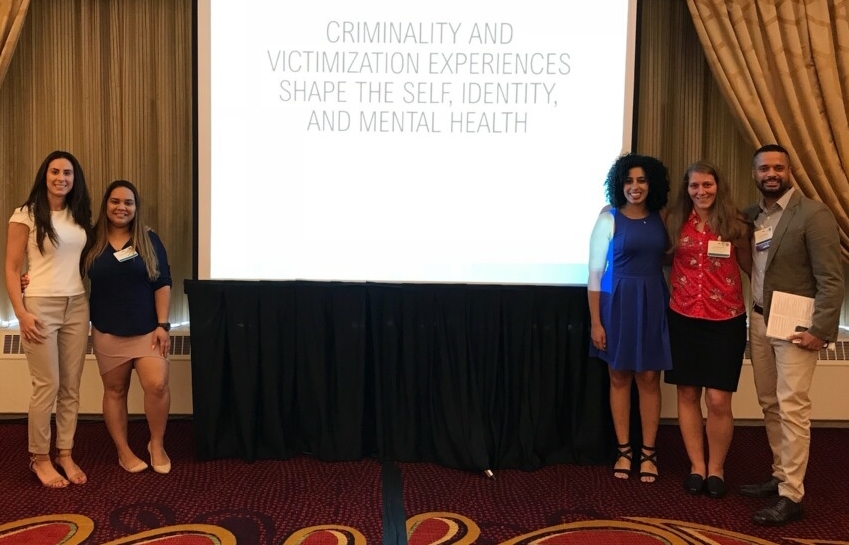RISC Lab Members present at SPSSI 2018, Pittsburgh, PA
Ethnic-Racial Centrality Moderates the Intellectual Disengagement and College Performance Relation
Tina V. Reifsteck, Luis M. Rivera
For African American and Latino individuals, professional and personal successes increase with academic achievement. However, pervasive stereotypes portraying their groups as unintelligent can detrimentally affect their college performance under certain conditions. To buffer such effects, African American and Latino students may employ intellectual disengagement strategies such as discrediting the credibility of academic performance-based feedback because it might be biased against their ethnic-racial groups. However, because students who strongly identify with their ethnic-racial group are most sensitive to ethnic-racial biases, they are likely to benefit academically to the extent that they adopt disengagement strategies. We tested this hypothesis with a sample of African American and Latino college students (N=88) who completed psychological disengagement and ethnic-racial centrality measures and provided permission to access their official transcripts. Results showed that high disengagement was associated with higher GPAs, but only among African American and Latino students who considered their ethnic-racial group central to their identity. Simultaneously, strongly identified students who did not adopt disengagement strategies had the lowest GPAs. These findings suggest that among strongly identified African American and Latino students, disengagement strategies can effectively counter the academic effects of ethnic-racial biases, which in turn can help reduce inequalities in academic achievement.
Reducing African-American Adolescents? Implicit Self-Stereotyping: An Ingroup Exemplars Intervention
Pamela B. Gomez, Alexandra Margevich, Luis M. Rivera
African-Americans? self-concept may be shaped by the negative stereotypes of their ethnic-racial group, evinced in a mental association between the self and negative stereotypes outside of conscious awareness. To the extent that African-Americans implicitly self-stereotype, it is likely best to reduce it during their adolescence, a key developmental period in which their ethnic racial self and identity are still being shaped by their environment. We tested if a brief intervention in which African-American adolescents are exposed to successful and admired ingroup exemplars, such as Barack Obama and Oprah Winfrey, reduces implicit self-stereotyping (presumably via group-attribute associative processes that underlie changes in implicit attitudes). African-American youth (N=65) were randomly assigned to read a biography of Obama, biographies of multiple successful African-Americans (Obama, Oprah, Venus Williams, etc.), or descriptions of flowers (control condition). Then, all participants completed two speeded categorization tasks that measured the extent to which they associated the self with stereotypes. Our findings suggest that a brief exposure to single and multiple exemplars may attenuate the impact of negative cultural stereotypes on African-American adolescents? self-concept when compared to the control condition. Altogether, our research supports the importance of increasing the presence of positive African-American exemplars in mass media and local environments.
Activating Implicit and Explicit Victim Identities: Implications for Mental Health
Nicole M. Sachs, Bonita M. Veysey, Luis M. Rivera
In 2015, over five million violent victimizations were reported to authorities in the U.S. The present study draws from social psychological theories of social identity, self-categorization, and implicit social cognition, which suggest that those who have experienced victimization should associate the self with victim explicitly and implicitly, but that context is important in making the victim identity salient. In this research, we ask, what is the effect of a victimization experience reminder on participants’ explicit and implicit victim identities? Using a sample of Rutgers-Newark undergraduate students (N = 181), we randomly assigned participants to an experimental condition in which we primed participants with a past victimization experience. Participants in the control condition did not receive a prime. Then, all participants completed measures of implicit victim identity (an Implicit Association Test) and explicit victim identity (a self-report questionnaire). We found that participants in the experimental condition exhibited significantly stronger explicit and implicit victim identities compared to those in the control condition. This research has implications for measurable outcomes of victimization related to explicit and implicit victim identity, such as mental health (depression and anxiety), and can aid in establishing efforts to prevent further victimization.
Experiences with Parolees Influence Parole Officers’ Implicit Self-Criminal Associations
Marina K. Saad, Bonita M. Veysey, Luis M. Rivera
In 2015, there were 870,500 parolees under supervision, the highest in U.S. history. Persons who are released from prison to parole have lower recidivism rates than those who are released from prison at the expiration of their sentence, reflecting the critical role of the parole officer-parolee relationship. The role of the parole officer is to assist parolees with successful reentry into society and in successful completion of parole terms. One way this relationship may be facilitated is through selfexpansion. Self-expansion posits that individuals are motivated to expand their self-concept to include others with whom they engage in close, frequent, and positive interactions. We predicted that parole officers would exhibit relatively strong implicit associations with the group criminal after being primed with a positive (versus negative) experience with parolees. Using a sample of parole officers from New Jersey (N = 84), we randomly assigned participants to either a positive or negative parolee interaction condition. Then, all participants completed an Implicit Association Test to measure associations between self and criminal. Results supported our hypothesis, suggesting that contexts that foster positive experiences between parole officers and
parolees may promote parolee desistance and promote overall parole officer well-being via self-expansion cognitive processes.


